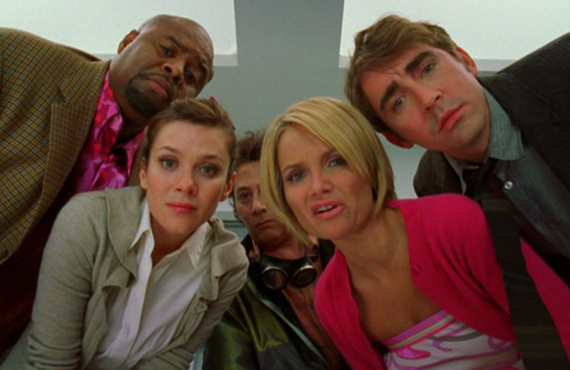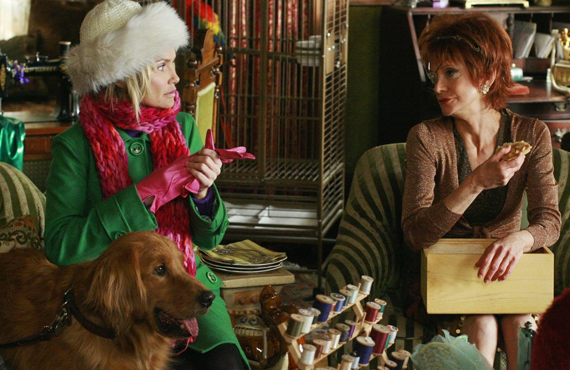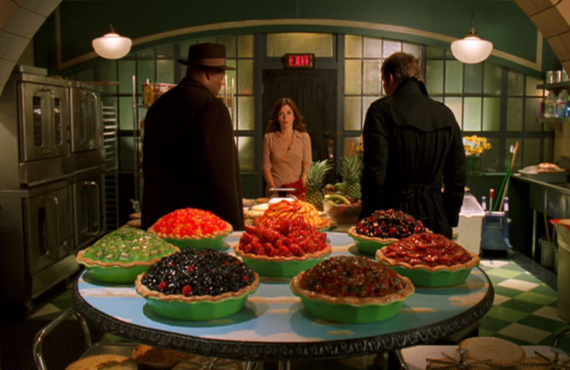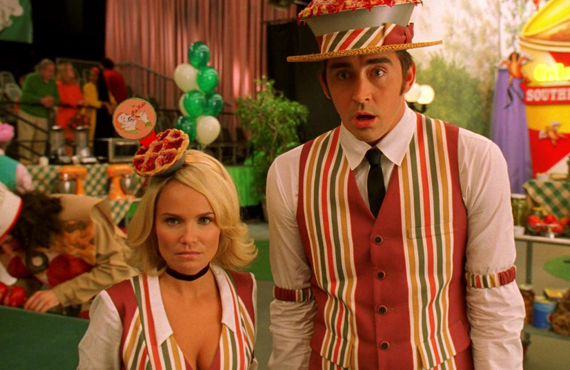The 10 Most Pie-Centric Episodes of Pushing Daisies
-
 Chi McBride, Lee Pace,Anna Friel, Swoosie Kurtz, Ellen Greene, and Kristin Chenoweth in Pushing Daisies. (ABC)
Chi McBride, Lee Pace,Anna Friel, Swoosie Kurtz, Ellen Greene, and Kristin Chenoweth in Pushing Daisies. (ABC)This piece originally ran on November 25, 2019. It's been updated for this year's holiday.
Pie is as vital to the Thanksgiving experience as any of the foods traditionally associated with that most celebrated of meals. And on this most pie-filled of holidays, what better way to celebrate the season than with a look back at the pie-infused world of Bryan Fuller's canceled-too-soon series Pushing Daisies?
A man of many talents, Ned (Lee Pace) put his myriad special skills to good use as the proprietor of the Pie Hole, where his title of Pie Maker was self-explanatory. The pie shop was the heart of Pushing Daisies, with its whimsical baked-crust signage and retro style booths adding to the time-warp aesthetic. Of course, Pushing Daisies wasn't a show about pie-making, and Ned wasn't simply a purveyor of sweet treats. He was also blessed (or cursed?) with the unique ability to bring the dead back to life with a touch (an ideal skill when your side hustle is helping out your private investigator pal). Emerson Cod (Chi McBride) utilized Ned's gift to quickly solve murders so they could collect the reward money. The Pie Hole served as the pair's primary meeting spot, where Emerson got to indulge in baked goods while Ned multitasked.
Here are the 10 most pie-centric episodes of this wonderful show for you to savor while you enjoy your pumpkin, pecan, and apple pies over the holiday.
1.01 - "Pie-lette"
In the pilot, past and present converged via the recently murdered Charlotte "Chuck" Charles (Anna Friel): Ned's childhood crush who he brought back to life (even if they could never touch each other). Before that, we got a flashback to Ned's childhood, and the mom he couldn't save. Ned's mom conjured up an image of the perfect 1950s TV matriarch with her sing-song voice and proclivity for baking. However, this is a Bryan Fuller show, so she had to die (you can't have the sweet without a little heartbreak). Food rituals and family go hand-in-hand, which is how Ned stayed connected to his mother's memory through his chosen profession. Ultimately, he couldn't save her, but in creating the Pie Hole, he kept her memory alive. Love reverberated around her kitchen, and their bond was now baked into every slice.
1.03 - "The Fun in the Funeral"
A wedge of happiness with Gruyère baked into the crust could be the Pie of the Day at an artisanal bakery in Williamsburg. Instead, Chuck's bespoke creation took the concept of comfort food to new heights via a secret ingredient: an FDA approved homeopathic antidepressant. Since Chuck could no longer look after her agoraphobic aunts Lily (Swoosie Kurtz) and Vivian's (Ellen Greene) in person anymore, she baked this antidepressant pie as her way of ministering to them in secret. Ned wasn't the only baker to use pie as a method of connecting to his past. Food acts as a reminder, so when Lily tasted the Gruyère, she associated it with her cheese-loving niece. In mixing the sweet and savory, Chuck also added a happy memory (as well as some much-needed medication) to her aunts' shared grief.
1.07 - "The Smell of Success"

If cronuts taught us anything, it's that people will line up for hours if an on-trend hybrid sweet is the reward. Chuck's cup-pies (cupcake + pie) were a horrifying concept to pie purist Ned, but the single-serve pie with honey (from her very own honey bees) baked into the crust sounds like a delicious winner to us. The very festive pumpkin pecan — described on the Pie Hole menu as 'World famous pumpkin pie, topped with fresh roasted pecans' — is also perfect for this time of year. Compromise is a cornerstone of any relationship, so while the Pie Maker was used to going it alone, having a new influence in his life ensured he took more adventurous (and tasty) steps. And that included changing up the Pie Hole menu.
1.08 - "Bitter Sweets"
Food waste is a problem for many businesses, but Ned's resurrection gift applied to all living things, including fruit. Pro: using cut-price spoiled ingredients was good for profit margins (and the environment). Con: Ned could never eat the pies he made, since the second he made contact with the fruit, it would immediately spoil and die again. A small price to pay for this miraculous talent, but this wasn't something that could easily be explained during a surprise health inspection. Molly Shannon and Mike White (Enlightened) guest starred as taffy-selling siblings targeting Ned's pie shop via nefarious methods, but really there should be no competition here (sorry, taffy fans).
1.09 - "Corpsicle"

The Pushing Daisies Season 1 finale used a pie to drop a soap-worthy twist. In a Christmas-set episode, the pear pie with Gruyère baked into the crust turned into a ticking time bomb after Olive (Kristin Chenoweth) accidentally laced it with too much herbal mood enhancer (Chuck told her it was vanilla). Using food as a manipulation tool, no matter the intentions, was never going to end well. The holidays are a time for over-indulgence, but no one told Lily that she would be going on this kind of psychedelic trip. Sometimes there is such a thing as too much pie.
2.02 - "Circus, Circus"
The magic of baked goods isn't just in the physical ingredients. Love played an important part in the creation of The Pie Hole, and this notion was baked into every pie. Secret ingredients could be delicious, but as Olive discovered, they could also be dangerous. This isn't a case of Joffrey from Game of Thrones getting poisoned on his wedding day, but the ripple effects of Olive learning in the Season 1 finale that Lily was Chuck's birth mom were huge. Olive fled to a nunnery, and Lily followed her. The next pie Chuck gave to her Aunt Vivian contained a sadder dose of endorphins: the crust contained cheese and tears after Vivian stopped by the pie shop unannounced. It was an emotional moment, which reminded us that not only was The Pie Hole the heart of Pushing Daisies, but the sweet baked treats were more than simple comfort food. They were a link between past and present.
2.07 - "Robbing Hood"

Food is a language of its own, and Bryan Fuller speaks it fluently, whether it's the dangerous decadence of Hannibal or the heightened emotions of Pushing Daisies. Love and loss played a huge role in the origin sory of The Pie Hole, however Ned also turned to baking during times of stress. As the stakes were raised, Ned's work productivity also increased to alleviate his tension. Unfortunately, customers weren't able to benefit from Ned's surplus baking, as Olive stress-ate the contents of the kitchen. The pros and cons of working alongside such delicious food.
2.08 - "Comfort Food""

Baking competitions are all the rage on TV these days, whether it is the gentle atmosphere of the The Great British Baking Show tent or the hilarious mistakes on Nailed It! Of course Peak TV didn't create the baking competition (they're as old as the county fair), so it only makes sense that The Pie Hole would compete in a baking competition of its own — and that Ned's duelling careers would clash once again. He proved he could be a multi-hyphenate at the Comfort Food Cook-Off when he solved the crime and took first place. And if there had been a prize for best-dressed, Olive and Ned's on-theme pie-topped boater hat and fascinator would have been the accessories to beat.
2.09 - "The Legend of Merle McQuoddy""
Throughout Pushing Daisies, pie had been used to push the story forward, as a metaphor, and to connect Ned to his past. With the return of Chuck's previously dead dad (who Ned accidentally killed when he was a kid), the tension between the two men was palpable. This wasn't a regular case of a dad disapproving of her daughter's boyfriend, particularly as Chuck and Ned would never have a regular relationship. Using dessert metaphors, her dad refers to pie (Ned) as being limited and simple, but we all know nothing could be further from the truth.
2.11 - "Window Dressed to Kill"
Ned lived a life of limitation: he couldn't touch his girlfriend without killing her, and the formally-rotten fruit pies are on his list of dietary restrictions. This all changed when he decided he wanted to be Clark Kent and not Superman, aka he no longer wanted to use his powers. Chuck's bare skin was still off limits, but his food options opened up. Normality means leaning into the Pie Maker moniker, but chaos soon followed, forcing him to use his life-giving abilities once again. By the end of the episode, rotten fruit had made a return, and his life without eating pie (or touching Chuck) continued. Luckily, Lee Pace eventually found a TV show in Foundation which let him indulge in more tangible pursuits.
Sadly, there were only a total of 22 episodes of Pushing Daisies. But in its brief run, it was the TV equivalent of your favorite pie: warm, comforting, and leaving you craving another slice.
Emma Fraser has wanted to write about TV since she first watched My So-Called Life in the mid-90s, finally getting her wish over a decade later. Follow her on Twitter at @frazbelina.
TOPICS: Pushing Daisies, Kristin Chenoweth, Lee Pace, Thanksgiving